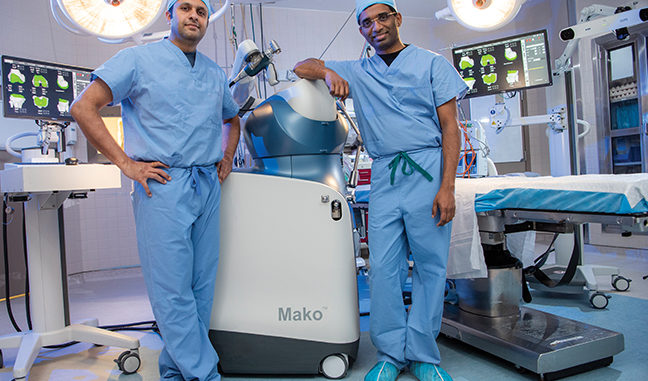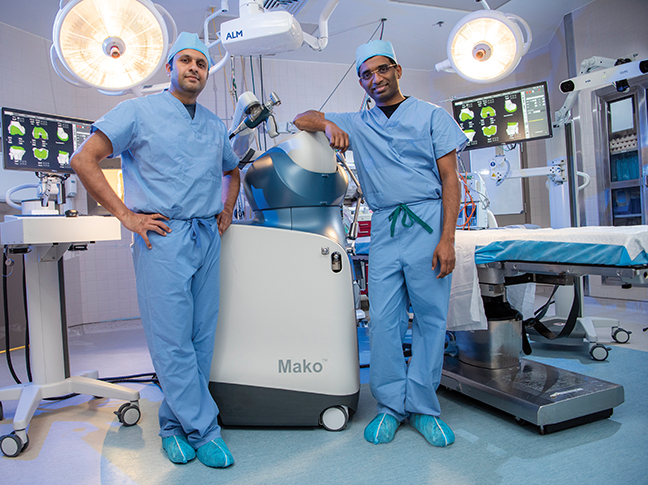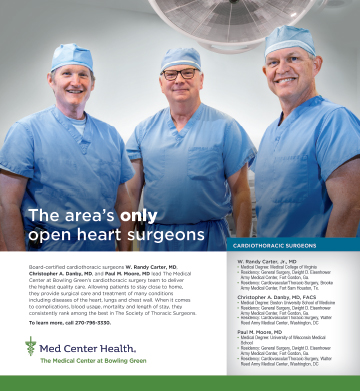
Anyone who has been through knee or hip replacement surgery will tell you the hardest part is the recovery; and if the new joint is even slightly off, there can be a lot of problems. There is a more precise alternative to traditional surgery that offers less pain for most patients, though – the more advanced Mako robotic-arm assisted surgery.
The Medical Center at Bowling Green is the only hospital in our region where this type of surgery is available, and only two local surgeons have advanced fellowship training in hip and knee replacement and are certified in this type of surgery – Sameer Badarudeen, MD, MPH and Rasesh Desai, MD, FAAOS, with Med Center Health Orthopaedics & Sports Medicine in Bowling Green. Both are UK HealthCare orthopaedic surgeons who also serve as assistant professors in the Orthopaedics department of the University of Kentucky College of Medicine.

A recent study published in the Journal of Bone and Joint Surgery showed 90 percent of Americans with osteoarthritis suffer too long before having a knee replacement. “When surgery is delayed,” said Dr. Sameer Badarudeen, “there can be more deterioration in function and mobility. This, in turn, results in patients becoming less active, gaining more weight and developing other health issues. So it is important to realize that to reap the full benefit of knee replacement surgery, it has to be done in a timely manner.”
Patients are understandably worried about recovery and potential complications of knee or hip replacement. “Mal-positioning of the implants and imbalance are the two major factors which can result in failure of knee and hip replacement,” said Dr. Rasesh Desai. “The main advantage of Mako robotic-arm assisted surgery for the patient is having accurate positioning of implants every time by removing human error. It also provides the surgeon with live tracking of knee balance and the ability to make corrections right then and there. The accurate positioning and well-balanced joint results in more natural feeling, less pain, faster recovery and potential increased longevity of the replacement.”
Why the need for joint replacement?
In a healthy knee or hip, cartilage creates a smooth, lubricated surface where the bones meet to form the joint. This provides shock absorption and lets the bones glide over each other. Unfortunately, it doesn’t heal itself very well. When cartilage is worn down or damaged, the result is pain – and a joint that can’t be trusted anymore. That’s when total knee or hip replacement may be necessary.
During knee replacement surgery, damaged bone and cartilage are removed. Metal components are added to the thighbone (femur) and shinbone (tibia). A plastic spacer acts like cartilage, making sure the new joint bends smoothly. Knee implants used for the Mako robotic-arm assisted surgery replace the knee’s natural, circular motion. This helps provide better stability as the knee is bent and flexed. Traditional implants are more limited, following only an oval motion.
Hip replacement involves removing the arthritic ball of the femur and inserting a metal stem-like component into the bone. The hip socket is also replaced. Mako robotic-arm assisted hip replacement helps preserve healthy bone, offers less likelihood of hip dislocation, and feels like a natural hip.
Why Mako robotic-arm assisted surgery?
Mako robotic-arm assisted surgery begins with 3D modeling of the patient’s joint and anatomy. Every step of the surgery is planned ahead of time with more accuracy. Robotic surgery has also been shown to provide increased safety and reduce risk to soft tissue surrounding the joint. Mako robotic arm-assisted total knee surgeries, compared to traditional knee replacement, can decrease postoperative pain, reduce need for pain medicines, improve leg muscle strength, decrease the number of physical therapy sessions, and improve knee range of motion.
“I had the experience of doing conventional hip and knee replacement surgeries for more than a decade,” Dr. Rasesh Desai said. “But for the last three years, I have been performing all my hip and knee replacement procedures with this robotic technology. I can confidently say that the results are far better and I would never go back to conventional replacements.”
For more information, visit MedCenterHealth.org or call Med Center Health Orthopaedics & Sports Medicine at 270-780-2750.
-submitted by Med Center Health

